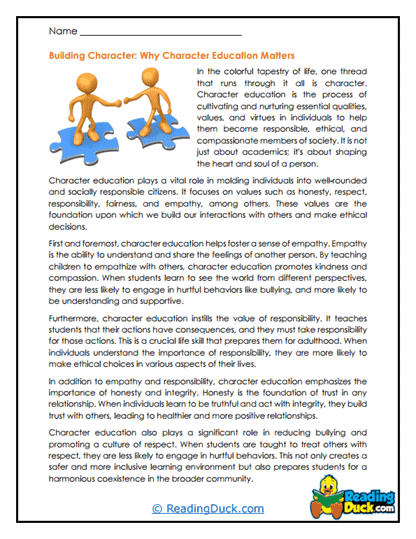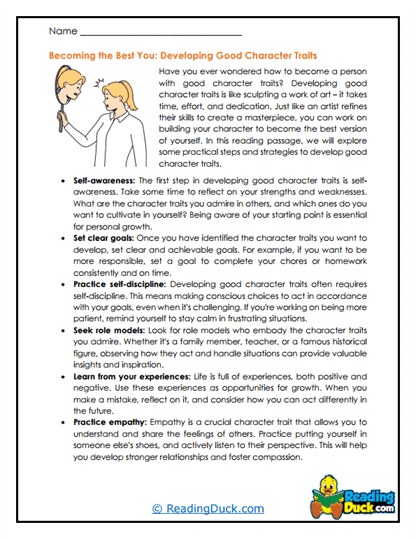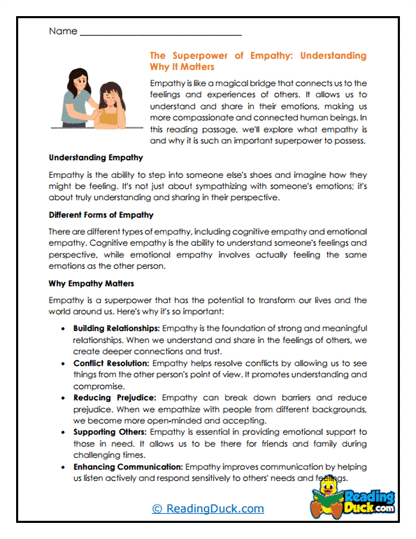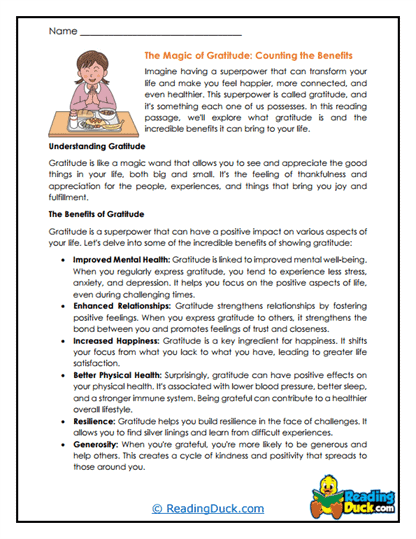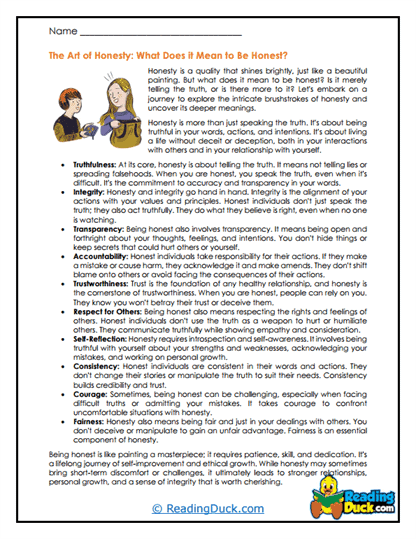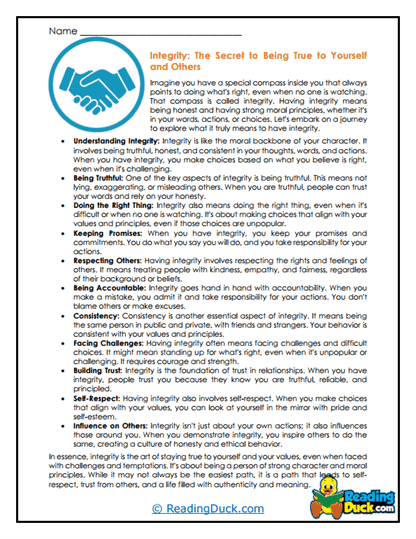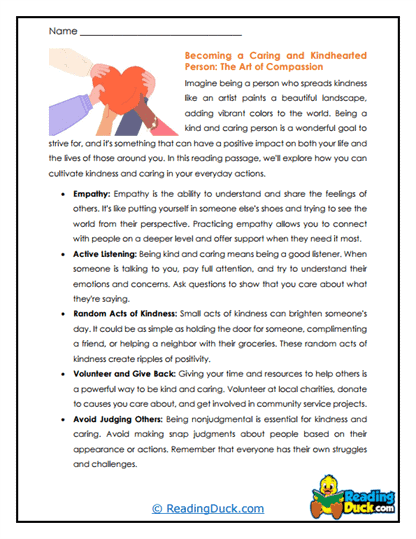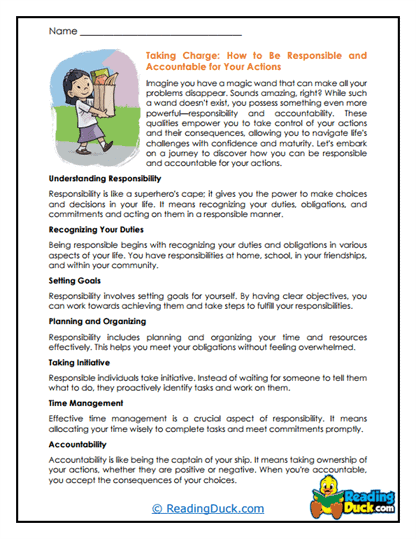Character Education Worksheets
About Our Character Education Worksheets
Our Character Education worksheets are designed to nurture and develop essential qualities that contribute to students’ overall growth and success in both academic and personal life. These worksheets guide students through various aspects of character development, such as empathy, integrity, respect, and responsibility. By engaging with these worksheets, students gain a deeper understanding of what it means to be a person of good character and how these qualities impact their relationships and community.
Each topic in this collection contains several worksheet sets, crafted to ensure a comprehensive learning experience:
- Multiple Choice Questions: These questions assess students' comprehension of the reading passages, helping to reinforce key concepts and facts about character education.
- Short Answer Questions: These questions encourage students to express their understanding in their own words, promoting deeper reflection and personal connection to the material.
- Open-Ended Questions: These questions invite students to explore their thoughts, opinions, and feelings related to the topics discussed, fostering critical thinking and personal growth.
These activities are designed to demonstrate students’ understanding of the material and enhance their connection to the subject matter. Each worksheet set includes an answer key, making it easy for educators to review and assess students' progress. All worksheets are available as PDF files, which can be easily viewed electronically, downloaded, and printed.
Building Strong Foundations: Exploring the Core Aspects of Character Education
Character education is a vital part of a student’s development, focusing on the cultivation of ethical values, moral reasoning, and the behaviors that contribute to a positive and productive society. When presenting this topic to students, it’s important to highlight the role that character traits play in shaping their interactions, decision-making processes, and overall contributions to their community.
Key Aspects of Character Education:
- Why Empathy Matters: Empathy is the ability to understand and share the feelings of others. Teaching students about empathy helps them develop compassion and kindness, enabling them to build stronger, more supportive relationships. Understanding empathy also fosters an inclusive environment where everyone feels valued and understood.
- How to Be Responsible and Accountable for Your Actions: Responsibility and accountability are crucial traits that help students recognize the impact of their actions on themselves and others. By learning to take ownership of their behavior, students develop a sense of integrity and trustworthiness. This aspect of character education encourages students to make thoughtful decisions and stand by them.
- Why Character Education Matters: Character education is more than just learning about good traits; it’s about applying these traits in everyday life. This topic helps students understand the importance of character education in their personal development and in creating a positive school culture. It emphasizes the long-term benefits of being a person of good character.
- Why Respect Matters: Respect is the foundation of all healthy relationships. Teaching students about respect involves understanding and valuing others’ perspectives, rights, and feelings. This topic helps students cultivate respect for themselves and others, leading to more harmonious and productive interactions.
- Integrity: Integrity is about being honest and having strong moral principles. It’s a core component of character education, as it guides students in making ethical choices even when no one is watching. This topic helps students understand the importance of staying true to their values and acting consistently with their beliefs.
- What Makes a Good Friend: Friendships are an essential part of social development, and understanding what makes a good friend is crucial. This topic explores the qualities that contribute to healthy, supportive friendships, such as loyalty, honesty, and empathy. Students learn how to build and maintain meaningful connections with their peers.
- Developing Good Character Traits: This topic focuses on the specific traits that contribute to good character, such as kindness, patience, and perseverance. Students are encouraged to reflect on these traits and consider how they can incorporate them into their daily lives. Developing good character traits leads to personal growth and better relationships.
- Benefits of Gratitude: Gratitude is a powerful emotion that can significantly impact a student’s outlook on life. This topic teaches students the importance of recognizing and appreciating the good things in their lives, which can lead to increased happiness, resilience, and positive relationships.
- Good Character Traits: This topic delves into a range of positive character traits, such as honesty, courage, and generosity. Students learn about the significance of these traits and how they contribute to a well-rounded and ethical individual. Understanding these traits helps students strive to embody them in their actions.
- What is Character Education: This topic provides a broad overview of character education, explaining its purpose and the role it plays in a student’s life. It helps students understand the importance of developing good character as a lifelong process that benefits themselves and society.
These topics provide students with a comprehensive understanding of character education and its importance in their lives. By exploring these aspects, students can develop the skills and values needed to navigate the complexities of life with integrity, empathy, and respect.
Why Students Need to Learn About Character Education
Learning about character education is crucial for students because it lays the foundation for becoming responsible, ethical, and empathetic individuals. As students grow, they encounter various challenges that require them to make decisions that reflect their values and character. By understanding and practicing good character traits, students are better equipped to handle these challenges in ways that contribute positively to their own lives and the lives of others. Character education also fosters a positive school environment where respect, kindness, and responsibility are the norm, leading to a more supportive and collaborative learning community.
Moreover, character education plays a significant role in students' academic and personal development. Good character traits such as perseverance, honesty, and respect directly impact a student’s ability to succeed in school and beyond. When students learn to value and practice these traits, they not only improve their academic performance but also build strong relationships and develop a sense of purpose and fulfillment. In essence, character education helps students grow into well-rounded individuals who can make meaningful contributions to society.
Integrating These Worksheets in a Curriculum
To effectively incorporate our Character Education worksheets into your curriculum, here are some tips for teachers and parents:
- Thematic Lessons: Organize lessons around specific character traits, such as empathy or integrity. This allows students to explore each trait in-depth and understand its significance in various contexts.
- Role-Playing Activities: Use role-playing exercises to help students practice applying good character traits in real-life situations. This hands-on approach reinforces the lessons and helps students internalize the values being taught.
- Group Discussions: Facilitate group discussions where students can share their thoughts and experiences related to character education. Encourage open dialogue to help students feel comfortable discussing their values and learning from each other.
- Creative Projects: Encourage students to create posters, videos, or presentations that promote the importance of good character traits. These projects allow students to express their understanding creatively and share their insights with others.
- Character Journals: Have students keep a journal where they reflect on their actions and thoughts related to the character traits they are learning about. This practice helps students track their personal growth and develop self-awareness.
- Incorporate in Daily Activities: Integrate character education into daily classroom activities by highlighting and rewarding examples of good character. This reinforces the importance of these traits in everyday life.
- Parental Involvement: Encourage parents to use these worksheets at home to reinforce the lessons learned at school. Parental involvement is crucial in creating a consistent message about the importance of character education.
- Service Projects: Organize community service projects that allow students to put their character traits into action. This real-world application of their learning helps students see the impact of good character in their communities.
By integrating these strategies into your curriculum, you can help students develop a deeper understanding of character education, foster their empathy and integrity, and empower them to make positive choices. The Character Education worksheets are a valuable resource that can be used in a variety of educational settings, making the study of good character traits accessible and engaging for all students. Through consistent practice and reflection, students will not only learn about the importance of character but also strive to embody these values in their daily lives, leading to personal growth and a stronger, more ethical society.
